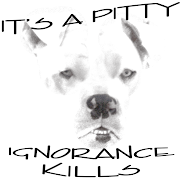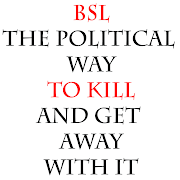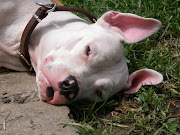
Before there are no more to fight for.
We owe It to them, for they are our constant companions, our friends, forever loyal.
Tuesday, June 10, 2008
Dutch Government To Lift 25 yr Ban On Pit Bulls
Jun. 9, 2008 11:03 AM
Associated Press
AMSTERDAM, Netherlands - The Dutch government says it will lift a long-standing ban on pit bulls because it did not lead to any decrease in bite incidents.
Agriculture Minister Gerda Verburg has informed parliament of the decision, which follows the advice of a commission of experts appointed to review the policy.
Instead, the country will focus on enforcing local leashing laws and owner education programs.
Spokesman Koen Geelink said Monday the ministry hopes to have a new policy in place by year-end, in which dogs that have displayed aggression will be tested by an expert.
The country banned the breeding and possession of pit bulls in 1993, after three children were killed by the dogs.
Tuesday, March 25, 2008
BANISHING DOGS
Breed-specific legislation is wrong
Is this a dog problem or a people problem?
Pit bulls and other so-called dangerous breeds have created such fear in some people that they want some restrictions. A proposal to let cities and counties ban or control certain breeds has been brought before the Legislature, sponsored by Rep. Perry Thurston, D-Plantation. His House Bill 101 would reverse an 18-year-old prohibition on breed-specific regulations.
And yet breed-specific legislation does not have a proven track record.
And such legislation is dead wrong.
Who's going to determine which breeds get targeted? Pit bull often describes three types of dogs - the American pit bull terrier, the American Staffordshire terrier and the Staffordshire bull terrier. But other breeds get mistaken for pit bulls. Are those part of the regulations?
What about Doberman pinschers, who got a lot of bad press years ago? And rottweilers? German shepherds used to be the big bad bully.
Any dog can become dangerous - especially those abused or trained to be aggressive.
And what about cross breeds? How would the pet owner or dog police determine ancestry?
Do we want to pay for a cadre of dog police to roam the streets looking for all the bad breeds?
No.
Animal control officials who do not back such breed-specific bans note they are tough to enforce and unfair to non-threatening dogs - all handed the dangerous-breed label without so much as a hearing. Due process? Forget that.
Then there are some who argue that breed-specific legislation is akin to racial profiling. Canine discrimination, they say. Are we going to round 'em all up and put them in fenced camps?
Breed bans also punish responsible pet owners. That, too, is not fair.
Protecting people from dangerous dogs is a worthy goal. But we should be targeting pet owners, enforcing leash laws and rounding up free-roaming dogs - not banning certain breeds.
Strong dog-bite laws, with owners getting socked with fines and losing their animals in extreme cases, would have a greater impact. Such vicious dog laws should be strictly enforced.
The Humane Society of the United States opposes breed-specific legislation. The organization notes that breed alone cannot predict a dog's temperament, citing a 2000 study published in the Journal of the American Veterinary Medical Association. The report, compiled by the Centers for Disease Control and Prevention, examined bite-related deaths in this country from 1979-1998 and found that 25 different breeds or crossbreeds were responsible - including St. Bernards.
The American Temperament Test Society has been administering standardized tests on dog breeds since 1977, measuring shyness, stability, aggressiveness and friendliness as well as protective instincts. Dogs that pass the test receive a Temperament Tested "TT" designation, and an average of 81.2 percent of all dogs have earned the TT title.
The American pit bull terrier, American Staffordshire terrier and Staffordshire bull terrier all scored at least two points above that passing mark. Rottweilers and German shepherds notched similar passing grades.
Several breeds that failed to pass include the beagle, collie and sheltie.
"Breed-specific legislation does not address the fact that a dog of any breed can become dangerous when bred or trained to be aggressive," the CDC wrote in that special report. "From a scientific point of view, we are unaware of any formal evaluation of the effectiveness of breed-specific legislation in preventing fatal or nonfatal dog bites. An alternative to breed-specific legislation is to regulate individual dogs and owners on the basis of their behavior."
The report goes on to note that in a "great many cases" of fatal attacks, problem behaviors - of dogs and owners - came to the attention of authorities beforehand and "should be sufficient evidence for preemptive action. . . ."
"Approaches to decreasing dangerous dog and owner behaviors are numerous. The potential importance of strong animal control programs is illustrated by our data."
The society also notes that out of the estimated 4.5 million dog bites annually, about 10 to 20 are fatal. While those numbers are still disturbing, and one death is too many, statistically the fatality rate is very low. A quarter of those dog-bite fatalities occurred while the canines were roaming off their owners' property.
That certainly points to a people problem - irresponsible dog owners who fail to keep their pets secure, and those who train the animals to be aggressive.
Breed-specific regulations will not work.
Thurston's measure looks like a loser in this legislative session. We hope that is true, since this is just overzealous government interference targeting the wrong part of the problemThursday, February 7, 2008
Friday, December 21, 2007
Wednesday, December 19, 2007
A Pit Bulls Christmas Carol
T'was the night before Christmas and the shelter is dark,
The whole place is silent, not even a bark.
The dogs are all locked in their pens for the night,
The staff has gone home and turned out the light.
As I lay my head on the cold concrete floor,
I fondly recall the home I had before.
The family I loved who loved me right back,
We'd share everything from secret to snack.
Things couldn't be better at this time last year,
But that has all changed and now I am here.
I won't see the tree, the lights or the snow,
I'm scared and alone, my spirits are low.
The others like me weren't put up for adoption,
A new family and home, for us aren't an option.
We've been locked up in cells as if we're all crooks,
We don't deserve homes because of our looks.
Not Diesel, or Bingo or the young one named Percy,
Deserve to be loved nor shown any mercy.
While families celebrate holiday cheer,
I know in my heart that my end is near.
The vet will arrive, the lights will go on,
By the time you awake, we all will be gone.
A stranger will come and take me away,
I'll never wake to see another day.
As I close my eyes I'll shed you a tear,
The fond memories I'll always keep near.
The only thing I've ever asked of Santa Claus,
Is to stop all these unfair, ridiculous laws.
You said without me, your life was not full,
So why does it matter that I'm a "pit bull"?
In my dream Santa shouts when he's finished his deed,
*
"MERRY CHRISTMAS TO ALL...REGARDLESS OF BREED"!
A Win In Court

COURT EXTENDS SIZE OF THE FIGHT OVER PIT BULL
Katie Bice
December 15, 2007 12:00am
A DOG owner has won Supreme Court action against a local council that wants to destroy her beloved pet, claiming it is an American pit bull.
Paula Nicholson said she was pleased after a judge yesterday ruled she had been denied natural justice.
But Ms Nicholson still faces an agonising wait for a review of "Pony's" case, and a final decision on his future.
She claims Pony is not a pit bull, but a bull mastiff-Staffordshire terrier cross.
She took the Mornington Peninsula Shire Council to court after its ranger impounded Pony in May as a restricted breed and told her the dog would be put down.
Ms Nicholson said in an affidavit she was shocked by the news.
"The thought of my dog Pony being destroyed has affected me emotionally and physically, and I have not been able to sleep properly," she said.
"Being an animal lover, I can not understand why anyone would want to destroy my companion and my best friend.
"Pony is a victim in this whole saga, yet he has done nothing wrong. This is a cruel and inhumane act."
The court heard Ms Nicholson appealed the ranger's decision, saying she had proof Pony was not a pit bull.
A hearing by three members of a Department of Primary Industry panel was held at the pound in July to determine Pony's breed.
In a secret ballot the panel members voted two to one that Pony was a pit bull.
Ms Nicholson claimed the panel hearing dismissed her photographic evidence of Pony's parentage and did not allow a vet called by her to fully address the hearing.
Her vet says Pony is not a pit bull and the method used by the panel to determine the breed was flawed.
Dr Gordon Watt said a panel member claimed because Pony had hazel eyes, a pink nose and rough coat he was a pit bull.
"In 24 years as a registered veterinary surgeon, I have come across many dogs with these characteristics who are not pure-bred American pit bull terriers," Dr Watt said.
Justice John Forrest said in his judgment yesterday Ms Nicholson should have been able to call evidence at the hearing, and the panel members did not perform their task within the law.
"It is clear, beyond doubt, that no proper hearing was afforded to the plaintiff," Justice Forrest said.
"The members of the panel simply examined the dog and then determined whether it did or did not conform with DPI guidelines.
"Evidence or submissions by the plaintiff were disregarded and the veterinarian was cut off by a non-panel member when giving evidence."
Justice Forrest ordered the council to hold a new hearing, noting that it should be performed by different officials.





